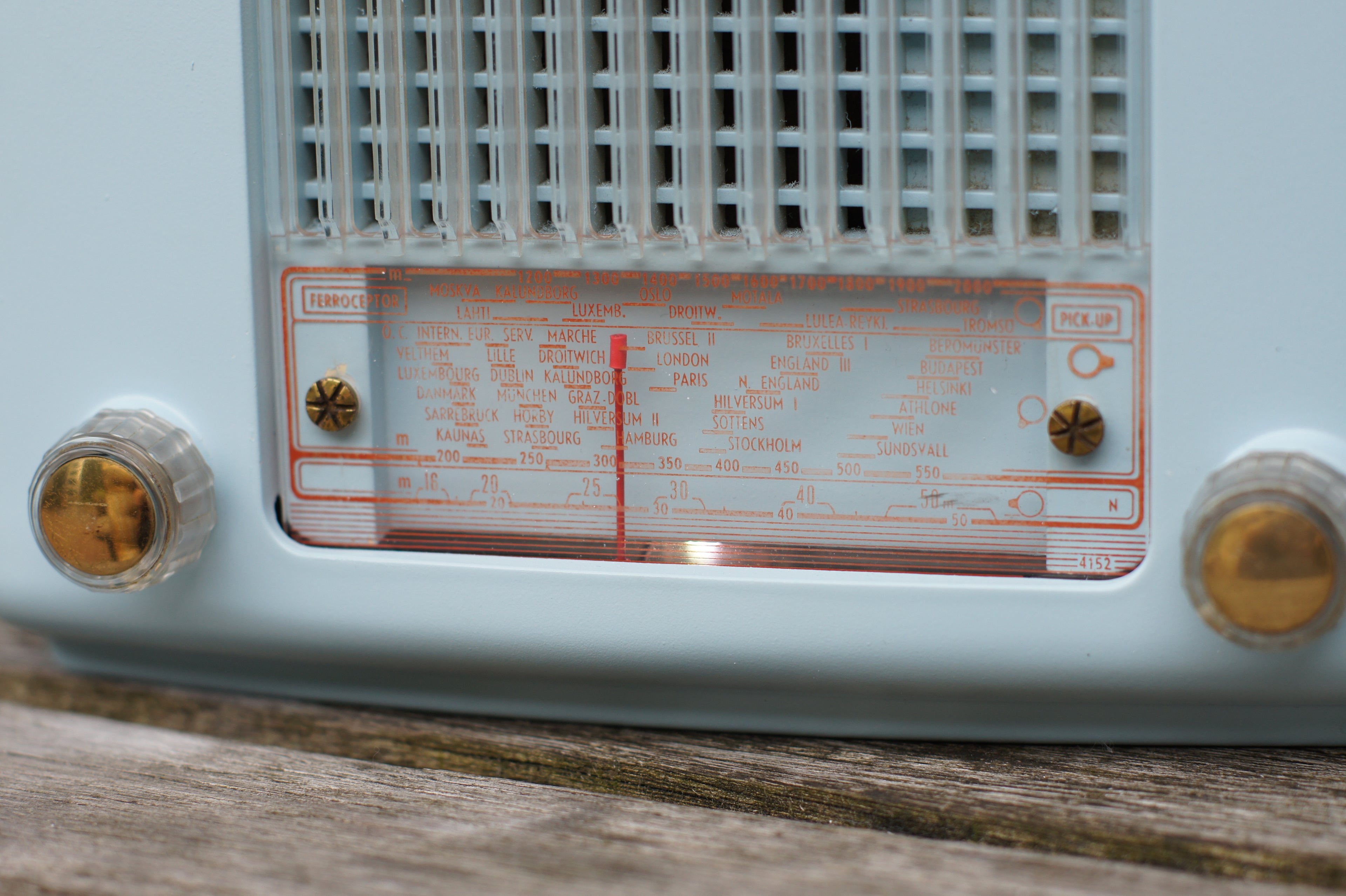
Ladilo Philips
Based on the Philips BX221U Tube Radio
Origins & Era
-
The BX221U was manufactured by Philips (Eindhoven) under the Miniwatt brand, around 1952–1953 tubebooks.org+14Radiomuseum+14LOT-ART+14.
Design & Construction
-
Form Factor: A table model—small, mantel-style, often referred to as "Midget" or "Compact"—constructed of durable Bakelite Radiomuseum+1.
-
Dimensions: Approximately 290 × 186 × 160 mm (about 11.4 × 7.3 × 6.3 inches) Radiomuseum.
-
Appearance: A rectangular cabinet with rounded edges, twin knobs on the front, and a grille—typical of early 1950s design LOT-ART.
Electronics & Tuning
-
The original electronics have been replaced with a Web Radio receiver, except the original loudspeaker, so it sounds as it would have back in the day
Power & Sound
-
Runs off USB, max. power consumption is around 3 watts.
-
Equipped with a permanent-magnet dynamic (moving-coil) loudspeaker, about 11 cm (4.3 inches) in diameter Catawiki+6Radiomuseum+6Radiomuseum+6.
Style & Collectibility
-
Its Art Deco style—rounded edges, Bakelite body, simple front panel—is characteristic of 1950s aesthetics LOT-ART+1.
-
Offers a nostalgic, warm sound signature from its all-tube design and compact form, making it a sought-after collectible among vintage radio enthusiasts.
Summary Table
| Feature | Description |
|---|---|
| Manufacturer | Philips (Eindhoven) |
| Production Years | ~1952–1953 |
| Case Material | Bakelite |
| Design Form | Compact table model |
| Speaker | 11 cm permanent-magnet dynamic |
| Style | Art Deco, collectible |
In Conclusion
The Philips BX221U is a charming mid-century tube radio that blends functional design with classic audio engineering. It offers versatile tuning across long, medium, and shortwave bands, housed in a compact Bakelite chassis. With its timeless styling, it's a lovely piece for both listening and display.
Description
Based on the Philips BX221U Tube Radio
Origins & Era
-
The BX221U was manufactured by Philips (Eindhoven) under the Miniwatt brand, around 1952–1953 tubebooks.org+14Radiomuseum+14LOT-ART+14.
Design & Construction
-
Form Factor: A table model—small, mantel-style, often referred to as "Midget" or "Compact"—constructed of durable Bakelite Radiomuseum+1.
-
Dimensions: Approximately 290 × 186 × 160 mm (about 11.4 × 7.3 × 6.3 inches) Radiomuseum.
-
Appearance: A rectangular cabinet with rounded edges, twin knobs on the front, and a grille—typical of early 1950s design LOT-ART.
Electronics & Tuning
-
The original electronics have been replaced with a Web Radio receiver, except the original loudspeaker, so it sounds as it would have back in the day
Power & Sound
-
Runs off USB, max. power consumption is around 3 watts.
-
Equipped with a permanent-magnet dynamic (moving-coil) loudspeaker, about 11 cm (4.3 inches) in diameter Catawiki+6Radiomuseum+6Radiomuseum+6.
Style & Collectibility
-
Its Art Deco style—rounded edges, Bakelite body, simple front panel—is characteristic of 1950s aesthetics LOT-ART+1.
-
Offers a nostalgic, warm sound signature from its all-tube design and compact form, making it a sought-after collectible among vintage radio enthusiasts.
Summary Table
| Feature | Description |
|---|---|
| Manufacturer | Philips (Eindhoven) |
| Production Years | ~1952–1953 |
| Case Material | Bakelite |
| Design Form | Compact table model |
| Speaker | 11 cm permanent-magnet dynamic |
| Style | Art Deco, collectible |
In Conclusion
The Philips BX221U is a charming mid-century tube radio that blends functional design with classic audio engineering. It offers versatile tuning across long, medium, and shortwave bands, housed in a compact Bakelite chassis. With its timeless styling, it's a lovely piece for both listening and display.
Care
To maintain the beauty and integrity of your purchase, we recommend treating it with care. Simple maintenance practices, such as gentle washing and proper storage, can effectively preserve the longevity of your favorites. We encourage you to refer to the care instructions included with each item, designed to help you keep your purchase in top condition.
Design
Our dedication to excellence extends beyond materials; it encompasses the artistry and craftsmanship illustrated in every piece we create.

